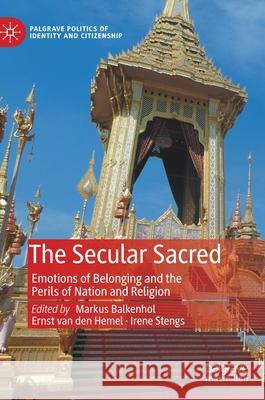The Secular Sacred: Emotions of Belonging and the Perils of Nation and Religion » książka
topmenu
The Secular Sacred: Emotions of Belonging and the Perils of Nation and Religion
ISBN-13: 9783030380496 / Angielski / Twarda / 2020 / 296 str.
Kategorie:
Kategorie BISAC:
Wydawca:
Palgrave MacMillan
Seria wydawnicza:
Język:
Angielski
ISBN-13:
9783030380496
Rok wydania:
2020
Wydanie:
2020
Numer serii:
000405607
Ilość stron:
296
Waga:
0.52 kg
Wymiary:
21.01 x 14.81 x 1.91
Oprawa:
Twarda
Wolumenów:
01
Dodatkowe informacje:
Wydanie ilustrowane











